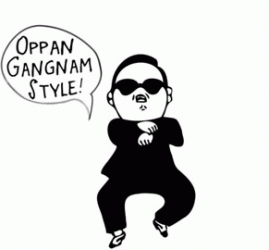There is no doubt that English phrases are commonly use in East Asian music. They tend to mix English lyrics as a transitional flow into their songs, especially in hip hop music. As author Phil Benson in “English and identity in East Asian popular music” (2013) mentions, it is could be a challenge of using a English transition flows, because they are “uneven, multidirectional and unstable, with no strong overall pattern emerging” (Benson, 2013). In this situation, evenly use English transnational flow in songs could be an obstacle for most East Asian singer, however, Psy as a native Korean male singer, has achieved commercial success of mixing Korean and English in his music and vast spreading worldwide.
By evaluating the numbers view and subscribes in comments section on the YouTube, Psy made a huge influence. For example, Gangnam Style has achieved over 30 billion views on YouTube, and the most unforgettable part within is this English phrase “Oppa Gangnam style” and followed by a transitional flow “Eh, sexy lady”. The repeated patterns of rhythm make this song impressive for audience worldwide. In addition, the success of this song is not just evaluating by the numbers of views, but also investigate how audiences are connected to this song with English transitional flows, by looking the comments sections. Benson believes the comments sections “create spaces in which the identity implications of language use can be negotiated across a virtual region” (2013). Subscribers define their identity by making comments using English, which implies the interactions between Psy as a native Korean and global audience, are accomplished.
In conclusion, Psy is successfully using the strategy of mixing the English transitional flow into his music, which reflects on the YouTube by great number of view and comments section.
Benson, Phil. “English and Identify in East Asia Popular Music.” Popular Music 32, no. 1 (2013): 23-33

